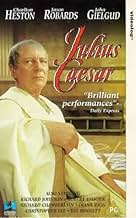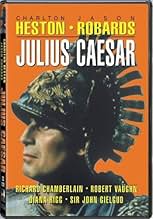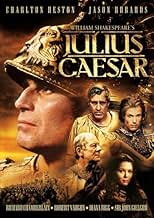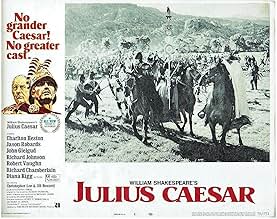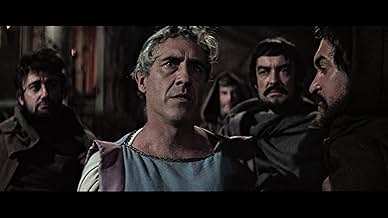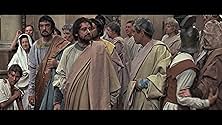Ajouter une intrigue dans votre langueThe growing ambition of Julius Caesar is a source of major concern to his close friend Brutus. Cassius persuades him to participate in his plot to assassinate Caesar, but they have both sore... Tout lireThe growing ambition of Julius Caesar is a source of major concern to his close friend Brutus. Cassius persuades him to participate in his plot to assassinate Caesar, but they have both sorely underestimated Mark Antony.The growing ambition of Julius Caesar is a source of major concern to his close friend Brutus. Cassius persuades him to participate in his plot to assassinate Caesar, but they have both sorely underestimated Mark Antony.
- Réalisation
- Scénario
- Casting principal
- Julius Caesar
- (as Sir John Gielgud)
Avis à la une
Antony and Brutus are each worried about their place in Caesar's affections and Brutus figures he's lost out to Antony. It makes him an easy mark for Cassius's plots. After the dirty deed of assassination is done, it's Antony and Octavius though they are teaming up against the conspirators, you can tell both in this version and in the better Fifties version that MGM put out that they will soon be at odds.
Charlton Heston is a strong Antony here, but unfortunately for the play to succeed you need an equally strong Brutus. That's not what you get in Jason Robards, Jr. For a man who in his time was considered the greatest interpreter of Eugene O'Neill, when it comes to Shakespeare the man was out of his league. No reflection on him, everyone has casting limitations.
A real good interpreter of the Bard who played Cassius back in 1954 plays Caesar here. John Gielgud is equally fine in both versions. And Richard Johnson and Robert Vaughn are superb as conspirators Cassius and Casca. And Richard Chamberlain who was trying very hard to shed his Dr. Kildare image is fine as the cunning Octavian who Antony ultimately underestimates.
Charlton Heston in his memoirs takes blame for casting Robards and Robards himself realized he was miscast. Oddly enough in that earlier version James Mason as Brutus was the best one in the film.
The most jarring for the military afficionados is the inappropriate armor and armament for the soldiers. The generals wear naval hats, and the armor is some kind of mish mash from other periods in history. I can only guess that this was done because the director liked the style (which was common for this period in film making for Hollywood to take such atrocious liberties with history).
It's worth it for seeing Chuck Heston's Marc Antony, but the version with Marlon Brando some yhears earlier (shot in black and white) is the one to see.
For all it's flaws, and there are many, this 1970 version staring Heston is worth a look. Heston plays Marc Antony as a passionate loyalist who seethes with the angst of betrayal, and does an ecellent job of it. Gielgud's Julius Caesar is solid, but I think the audience deserved someone with more gravitas and "a martial countenance", to borrow from the language of the time.
See it once.
Le saviez-vous
- AnecdotesRobert Vaughn says in his memoirs that Jason Robards, Jr. was very unhappy during the filming period, and dubious about the end result.
- GaffesCassius drinks from a wooden cup during the riot scene. When he throws the wooden cup it makes a sound as if it was glass.
- Citations
Julius Caesar: Let me have men about me that are fat; Sleek-headed men, and such as sleep o' nights. Yond Cassius has a lean and hungry look; He thinks too much: such men are dangerous.
- ConnexionsFeatured in History Buffs: Rome Season Two (2017)
Meilleurs choix
- How long is Julius Caesar?Alimenté par Alexa
Détails
- Date de sortie
- Pays d’origine
- Site officiel
- Langue
- Aussi connu sous le nom de
- Julius Caesar
- Lieux de tournage
- Société de production
- Voir plus de crédits d'entreprise sur IMDbPro
- Durée
- 1h 57min(117 min)
- Mixage
- Rapport de forme
- 2.35 : 1

